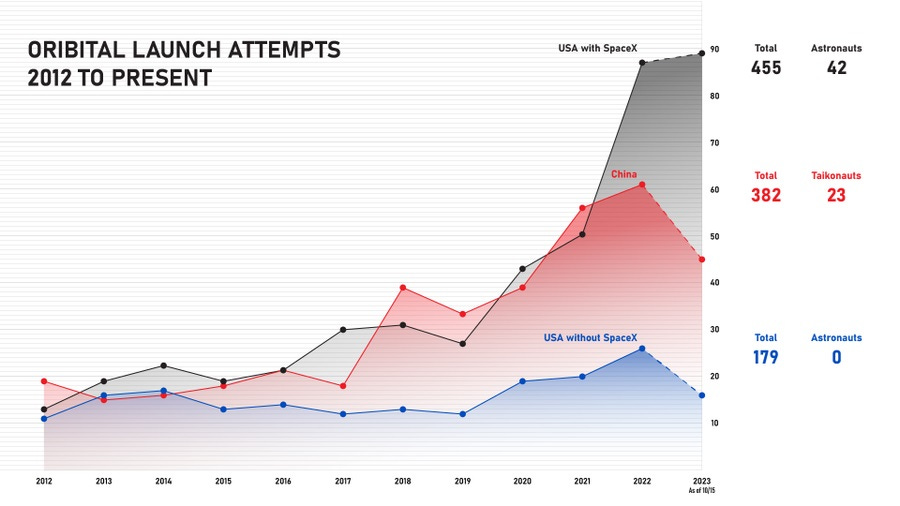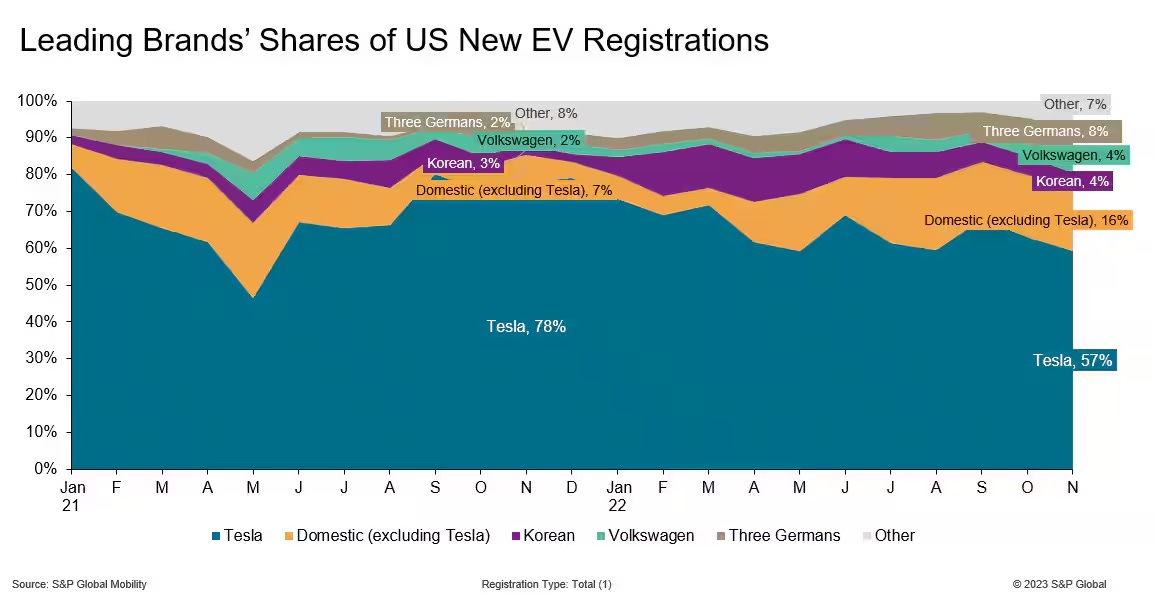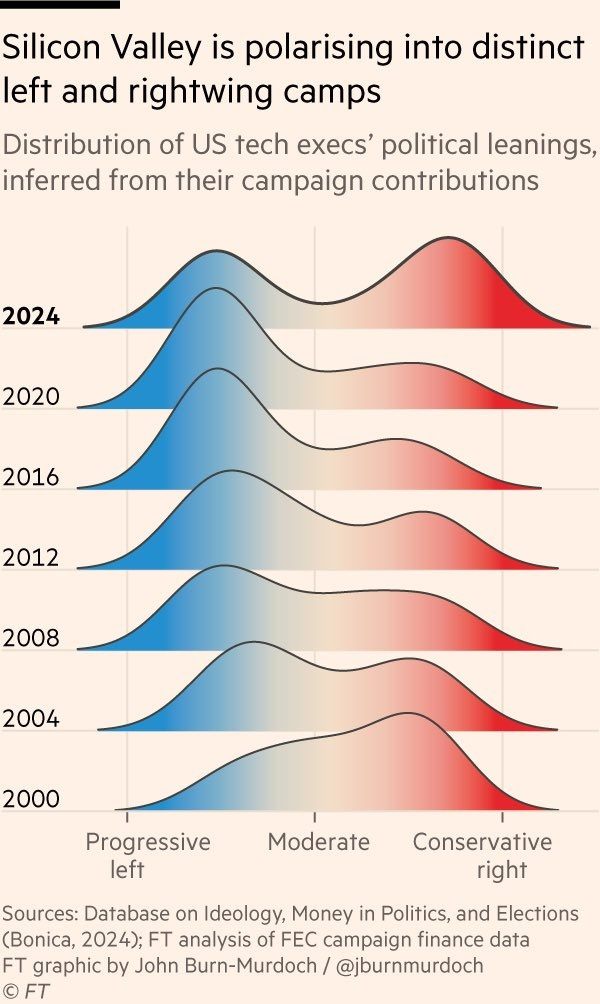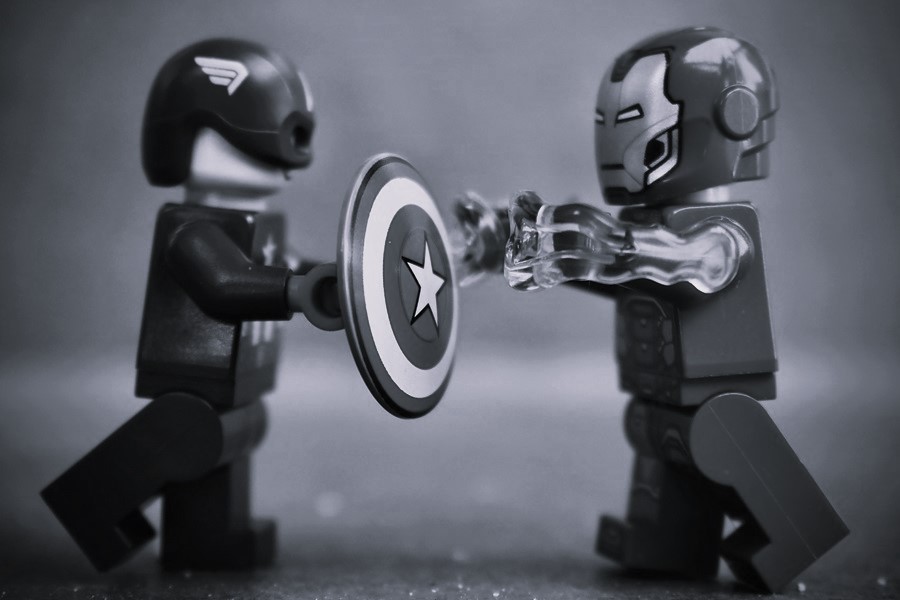“With great power comes great responsibility.” — Spider-Man
“No God. The only man in the sky is me.” — Homelander
I often remark on how much the modern world resembles the cyberpunk sci-fi novels I read when I was a kid. But occasionally it takes a page from a different genre: superhero comics.
Imagine I went to a Hollywood studio with the following plot: It’s the year 2024. War is breaking out all over the world. Asia is threatened by communists; Europe, by fascists. Only America stands against these totalitarian empires, but its society is divided and its industry is outmatched. But there’s one man could save America — and, by extension, the world. A reclusive genius and peerless industrialist, he has built a fleet of gigantic rockets that can take off and land halfway across the world, blanketed the heavens with satellites, and created futuristic cars that singlehandedly revived America’s auto industry. He’s in the process of creating a colony on Mars. Oh, and he also owns the country’s most important social network, controlling the flow of information between journalists, politicians, and the public. But is this towering figure a superhero, or a supervillain? Between personal troubles (insert complex backstory here) and battles with smug government bureaucrats, he’s grown disillusioned. Agents of freedom’s enemies reach out to him, coveting his technological marvels for themselves. Will he save the day, or go over to the other side?
This proposal would probably get rejected. We already have one Iron Man, the studio exec would tell me. And for that matter we also have a Batman, a Dr. Doom, a Green Goblin, and an Adrian Veidt. We don’t need another of these guys. He’d hand me back my spec script and tell me to come back when I have something less derivative.
And yet somehow we find ourselves living in this comic-book reality. Even as American manufacturing (and German manufacturing, and Japanese manufacturing, etc.) has been hollowed out by Chinese competition and our great old companies have stumbled and declined, one single entrepreneur has been able to build and scale gigantic new cutting-edge high-tech world-beating manufacturing companies in the United States of America. That one man is Elon Musk.
Consider SpaceX. Without this one Musk company, America would be lagging far behind China in the space race. But with SpaceX included, the U.S. is far ahead of China:

And SpaceX is a manufacturing powerhouse. Despite doing almost all of its manufacturing in the United States, the company has been able to outmanufacture all of China in its field.
SpaceX isn’t just ahead in quantity, but in the level of its technology. In this astonishing video, you can watch a SpaceX “chopsticks” crane catch a sky-scraper-sized rocket booster in midair:
Nor is this simply about launch capability. SpaceX has already launched so many Starlink communication satellites into low Earth orbit that Musk’s constellation now outnumbers all other active satellites and spacecraft combined:
“Starlink’s ambitious plan to run a constellation of 30,000 satellites is still taking shape, but even with only a fraction of that network in operation, SpaceX owns roughly 60% of all active satellites in orbit, according to new data from space technology firm Slingshot Aerospace.
“Approximately 89% of orbiting satellites now belong to commercial firms as opposed to government or military groups; last year, 5,648 of the 9,241 active satellites were from Starlink.”
It’s not as if other businesspeople haven’t tried their hands at space. Jeff Bezos, creator of the world’s premier e-commerce site and the world’s top cloud computing network, founded Blue Origin, a SpaceX competitor, but it lags far behind. Some other launch companies are now spinning up, but they’re many years behind SpaceX. Boeing isn’t even really in the competition.
While it would still be hyperbole to say “one man now rules the heavens”, it wouldn’t be that crazy of a statement.
But SpaceX is neither a fluke nor a special case. Despite a recent modest increase in competition, Tesla still utterly dominates the market for electric vehicles in the U.S.:

Internationally, only BYD can stand up to Tesla, with major assistance from the Chinese party-state.
And when Elon recently set up a cluster of GPUs to train his new AI model, it was done far faster than Nvidia CEO Jensen Huang believed possible:
“Elon Musk and the team behind xAI have achieved an engineering marvel, setting up a supercluster of 100,000 H200 Blackwell GPUs in a whopping 19 days. Nvidia CEO Jensen Huang told the story of Elon Musk’s incredible installation prowess with members of the Tesla Owners Silicon Valley on X.
“Huang describes Musk’s 19-day escapade with awe and respect, calling the effort ‘superhuman’. The team at xAI purportedly went from the ‘concept’ phase to full-ready compatibility with Nvidia’s ‘gear’ in less than three weeks…Huang states that it takes an average data center four years to do what Elon Musk and his team were able to do in 19 days…Elon Musk’s integration of 100,000 H200 GPUs has ‘never been done before’ (according to Jensen Huang) and probably won’t be duplicated again by another company, at least not for a very long time.”
Elon might not fly around in a robot suit and blast his rivals with energy beams, but his ability to out-manufacture and out-innovate almost all of his rivals is right out of a comic book movie trope.
How does he do it? The exact specifics are probably impossible to pin down, but the general contours are nothing mysterious. Elon isn’t hyperintelligent or hyper-creative. Most of the engineers at SpaceX or Tesla are probably better at their jobs than he could be. His superpower — according to a bunch of people I’ve talked to in the tech industry — is gathering, motivating, coordinating, and setting goals for human talent.
This is the same superpower possessed by Genghis Khan, or Henry Ford, or Vladimir Lenin, or Matsushita Kōnosuke, or any number of other people who built big organizations from scratch. Humanity is a collective organism — directed toward a common goal, we can accomplish incredible things. But our talents are not equal, our motivations are not consistent, and our goals are not naturally aligned. An organization-builder is someone who takes the purposefulness of a single individual and applies it to a group of people.
In fact, Elon is just the most standout example of this superpower. Economists have long noted that founder-led companies outperform others. For example, here’s Lee et al. (2016):
“Our main results show that the existence of a founder CEO is correlated with a 31 percent increase in the citation-weighted patent count before we control for R&D spending and a 23 percent increase in the citation-weighted patent count after we control for R&D spending, suggesting that founder CEOs are more effective and efficient innovators than professional CEOs…[T]he positive effect of founder CEOs on innovation is stronger in more competitive and innovative industries…Finally, we provide evidence that the innovations of founder CEO-managed firms create more financial value than the innovations of professional CEO-managed firms.”
And here’s Fahlenbrach (2009):
“Founder-CEO firms differ systematically from successor-CEO firms…Founder-CEO firms invest more in research and development, have higher capital expenditures, and make more focused mergers and acquisitions. An equal-weighted investment strategy that had invested in founder-CEO firms from 1993 to 2002 would have earned a benchmark-adjusted return of 8.3% annually.”
…And so on.
Barack Obama once declared “If you’ve got a business, you didn’t build that. Somebody else made that happen.” But he was wrong. Yes, human organizations are a collective enterprise. But the unique value of entrepreneurs in gathering, selecting, coordinating, and inspiring the people in an enterprise can’t be minimized. If “that” is an organization, then yes, an entrepreneur did build that.
This, by the way, is why almost everyone in the tech industry — even people who disagree with him politically — hold Musk in such awe. It’s not that he has a lot of money — most tech people couldn’t care less about Warren Buffett, and they don’t even know the names of hedge fund managers. It’s that Musk is superhumanly good at the thing they’re pretty good at. He has built world-beating organizations, and moreover, he did it in the super-tough area of high-tech manufacturing — a field so difficult that most tech entrepreneurs shy away from it and stick to the safer waters of software.
Musk’s influence and leadership probably has something to do with the new right-wing turn among many tech executives:

In recent months, a number of progressive commentators have suggested that Musk’s support for Donald Trump is part of a campaign to become a “Shadow President”. Many people I talk to in the tech industry also believe this — but they think of it as a good thing. Many of them, even the conservatives, despise Donald Trump as a human being, but they hope that with Trump aging and fading, Musk and J.D. Vance will be running the show in a competent technocratic manner. Put a superhero in charge, the thinking goes, and you get super-results — just as happened with SpaceX and Tesla.
But superpowers are inherently dangerous. For one thing, when you have all that power concentrated in the hands of one man, you incur a ton of idiosyncratic risk — if the superhero makes a bad decision, the whole populace is screwed. Also, power corrupts — humans are fallible beings, and the temptation to use one’s superpowers to settle scores, torment one’s critics, or simply rule the world is very large.
Most of superhero comics are about this. “Superheroes” are the super-people who subordinate their own wishes and desires to the good of broader society — Superman could become Earth’s absolute ruler, but instead he chooses to live a humble life and fight for “truth, justice, and the American way”. “Supervillains”, meanwhile, are the people who let their own desires override the public’s. Some are motivated by pure will to power (Dr. Doom, Green Goblin) or whimsical nihilism (The Joker), while others have a strong sense of their moral self-righteousness (Magneto, Adrian Veidt).
The people with real-life superpowers — great organization-builders like Musk or Genghis Khan — are especially in danger of becoming supervillains. The reason is that organizations themselves — nations, bureaucracies, companies, etc. — are the way humanity tames and restrains individuals’ own desires and will to power. But organization-builders are not company men — Elon Musk is not the type of guy to work within someone else’s organization and subordinate his will to its, because that’s just not what he does.
An interesting illustration of this comes from the book Freedom’s Forge, which is about America’s World War 2 mobilization. Industrialists were key to this process, but Henry Ford — the country’s premier organization-building entrepreneur at the time — wanted little to do with it. He staunchly opposed Lend-Lease, believing (correctly) that it would drag America into a world war. Instead it was Bill Knudsen, who built the Chevrolet division at GM, who became the U.S. government’s point man for the war effort. He was a company man and an “intrapreneur” rather than an entrepreneur. When he tried to get Ford to join him, Ford shouted him out of his office.
In fact, the parallels between Elon Musk and Henry Ford can get downright eerie. Both built world-beating car companies and became the richest man in the world. Just as Elon bought Twitter and turned it into X in order to advance his own viewpoints, Henry Ford bought the Dearborn Independent and turned it into the country’s second-most-widely-read newspaper by putting it in every Ford dealership. And just as X has seen an explosion of antisemitism, the Dearborn Independent ran a series of columns about “The International Jew”. Ford eventually apologized for this antisemitic content and disavowed any personal involvement, just as Musk deleted his tweet promoting a Tucker Carlson segment that defended Adolf Hitler and apologized for a tweet where he agreed with someone who claimed that Jews are anti-White. Ford also received a lot of negative attention and scrutiny for his factories in Nazi Germany, just as Elon’s Gigafactory Shanghai has raised questions about China’s ability to pressure him. (For more about Ford, I recommend the book The Arsenal of Democracy by A.J. Baime.)
After Pearl Harbor, Ford did join the war production effort, creating the country’s most spectacular arms factory at Willow Run, and producing vast numbers of tanks, Jeeps, and bombers for America. Henry Ford himself was in his 70s by this time, and much of this effort was directed by his semi-estranged son Edsel. But in the end, Ford chose to lend his superpowers — in the form of the organization he built — to the cause of America.
But eras are different, and individuals are different, and there’s no guarantee Musk will throw his wholehearted support behind America. The Wall Street Journal recently reported that Musk has been having regular secret conversations with Vladimir Putin:
“Elon Musk, the world’s richest man and a linchpin of U.S. space efforts, has been in regular contact with Russian President Vladimir Putin since late 2022…The discussions, confirmed by several current and former U.S., European and Russian officials, touch on personal topics, business and geopolitical tensions…At one point, Putin asked the billionaire to avoid activating his Starlink satellite internet service over Taiwan as a favor to Chinese leader Xi Jinping, said two people briefed on the request.”
As the Journal notes, the start of these conversations happened at the same time that Musk switched from being a staunch Ukraine supporter into a fierce opponent of aid to Ukraine.
What the heck is going on here? I see three (non-exclusive) possibilities.
First, Elon is a builder, not an organization man. He may simply have been dissatisfied with American foreign policy and decided to build his own instead of going along with someone else’s decisions.
Second, Putin is an expert in bringing rich entrepreneurs to heel. His rule has been characterized by the co-opting of some Russian oligarchs and the utter destruction of those who refused to be co-opted. He may have used his trademark combination of flattery and threats — possibly “kompromat” or even threats of violence against Elon’s person — to dominate Musk.
And third, Musk may simply believe — as Donald Trump has declared — that internal enemies are more threatening to America than external ones. Musk is a conservative, but not in the Tom Cotton or Dan Crenshaw tradition — he believes that the “woke mind virus” is killing America. It’s possible that he sees Putin and Xi as a secondary threat to the nation — frenemies to be bought off or compromised with while wokeness is rooted out of America.
My suspicion is that the third of these is the most important factor. The MAGA movement has clearly decided that if American culture continues to trend in a progressive direction, there won’t even be an America worth defending from outside powers. Ronald Reagan spoke of America in soaring language; Trump has called America “a garbage can for the world.” But Reagan, after all, had free enterprise, traditional Christian values, and pride in America’s history to defend from the USSR; if American culture is defined by land acknowledgements, neopronouns, open borders, and anti-business regulators, why should conservative entrepreneurs put their superpowers to work defending all of that against China or Russia? Better to leave Eurasia to the Eurasian empires and focus on restoring the America they remember from the 1980s and 1990s.
This is a tragedy. America’s superpower has always been to recruit talented immigrants like Elon Musk and to inspire them to love and fight for their adopted nation. Bill Knudsen, born in Sweden, never once questioned whether the America he fought for was worth the effort. If the America of the 2020s can’t even inspire immigrants to use their individual talents to guard it against the likes of Xi and Putin, then we have lost our national superpower.
Because Xi and Putin have a very different superpower from Elon Musk. They are the consummate organization men — backroom arm-twisters who came up within existing organizations (the CCP and the KGB/FSB) and bent them to their will. They have the power of Stalin rather than the power of Lenin — the power of Henry Ford II rather than Henry Ford I. America can’t defeat them without Musk and people like him. But Musk cannot defeat them alone either — there is nothing they’re better at than bringing private entrepreneurs to heel.
Only the combined powers of America and Musk can stand against those empires.
In the wake of the revelations about Musk and Putin, many are calling for Musk’s security clearance to be revoked. But what would that accomplish? Even if Trump doesn’t just restore the clearance in short order, America would alienate and lose its most important defense contractor — the only man capable of out-manufacturing China, the man whose satellites rule the heavens, the man whose rockets could transport military cargo to Taiwan in an hour.
The fact is, entrepreneurs like Musk do have organizational and inspirational superpowers. Democrats and progressives have downplayed and underrated those superpowers over the last decade, but they’re absolutely necessary if we’re to be able to defend ourselves against the empires that threaten our prosperity, our freedoms, and our security. America must win its own hearts and minds — yes, the hearts and minds of the masses, the workers, and the corporate managers who make big organizations function on a day-to-day basis. But it must also win the hearts and minds of entrepreneurs.
A comic-book world of superheroes and supervillains isn’t necessarily the one we’d choose to live in. But in some ways, it’s the world in which we find ourselves living, and we have to deal with that.
This article was originally published in Noahpinion and is republished here with permission.








